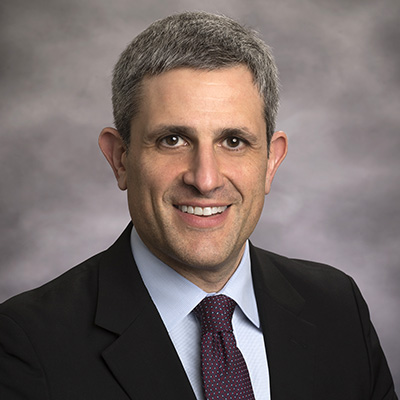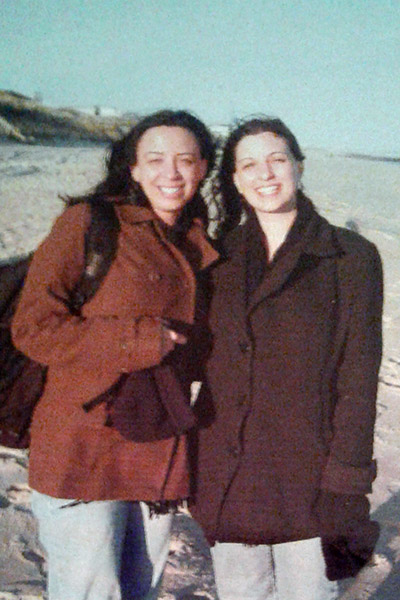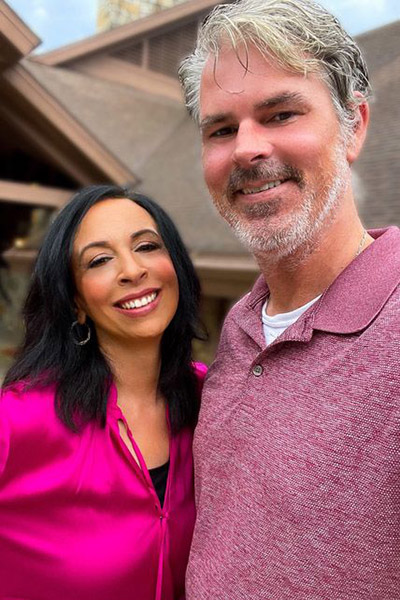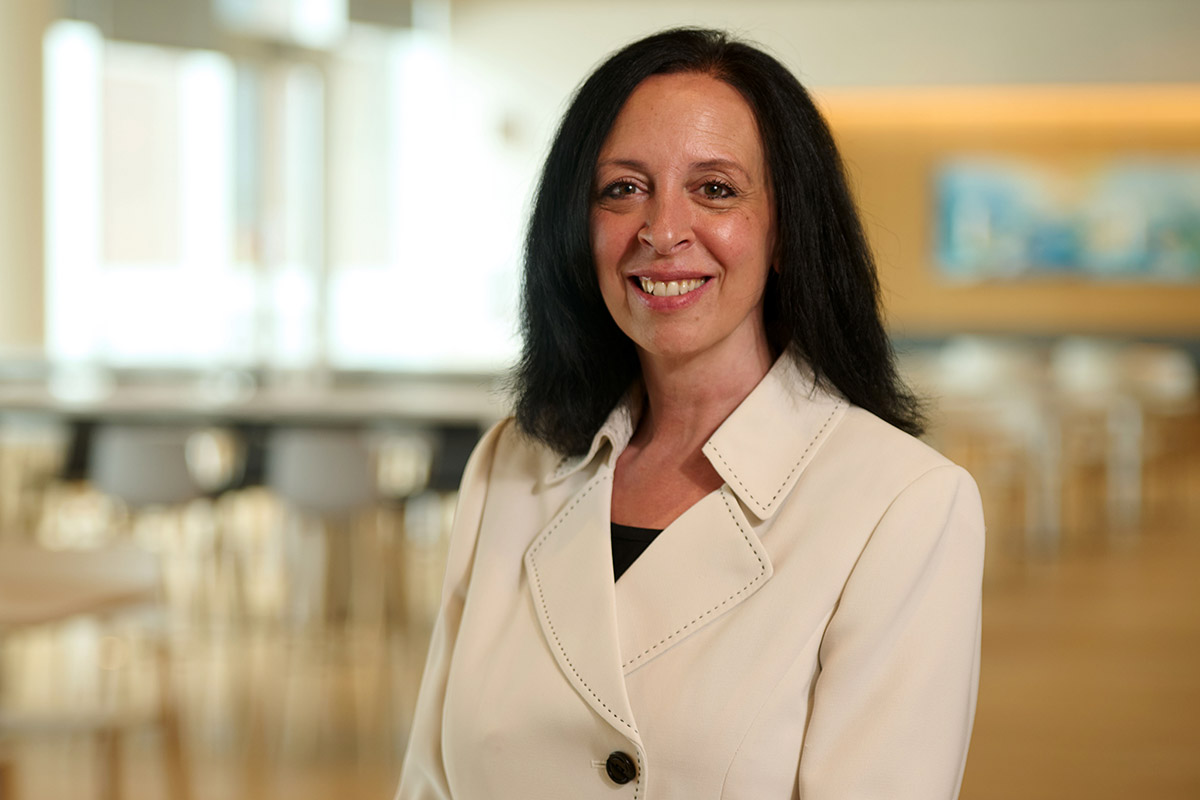At Winship, we were always a step ahead of the cancer. That’s the difference.
Lillian's Doctor
-
Kevin Kalinsky, MD, MS, FASCO Director, Glenn Family Breast Center

Lillian and her sister, Cynthia, lived active, health-conscious lives. Both were runners, and her sister followed a vegetarian diet. Both tested negative for any known genetic predisposition for breast cancer. That’s why their diagnoses were so unexpected.
“I would have never guessed that I would ever be diagnosed with breast cancer,” she says. “It was a complete shock to me. It was a complete shock when my sister was diagnosed because we had no history and no genes of any cancer.”
Lillian was diagnosed with breast cancer four years to the day after her sister died from breast cancer at age 41. She had no symptoms. “I noticed a little bump or indent on the lower part of my breast one day,” she says. “I went to the doctor. I was initially diagnosed with stage one, very low-grade breast cancer at a different facility. It ended up being a stage three diagnosis—much more intense than initially thought.”
Lillian sought a second opinion soon after her initial diagnosis. At the facility where she was diagnosed — where her sister died — Lillian says she was pushed toward surgery without ever even meeting an oncologist, which made her very uncomfortable. “So, I decided to call Winship,” she says.
Lillian recalls, “At Winship, it was a completely different experience than where I was before. The entire team met with me on my first visit.” The team included her medical oncologist, Kevin Kalinsky, MD, MS, director of the Glenn Family Breast Center at Winship, a breast surgeon and a plastic surgeon. They even conferenced in Lillian’s close friend, an oncologist in New Jersey who had cared for Lillian’s father after his cancer diagnosis.
It’s an understatement to say Lillian was worried at this point. “I came into this with a lot of trauma because all I knew of cancer was death,” she says. Besides her sister, both of Lillian’s parents died from cancer, “all very young.” Lillian was especially concerned about her niece and nephew she was raising since her sister’s death. She says, “When I came to Dr. Kalinsky, all I kept saying to him was, ‘Please keep me alive because I promised my sister I would take care of her children.’”
Getting to a correct diagnosis

Lillian and her sister, Cynthia
The biopsy and results from the earlier facility had given the false impression that Lillian’s cancer was less serious than it turned out to be. “What we thought was going to be maybe a stage two turned into a stage three because during surgery they found a few positive lymph nodes,” she says. “Winship worked extremely quickly to provide the correct diagnosis and the correct treatment.”
To move forward with her cancer care, Lillian and her Winship care team essentially had to start over. New imaging had to be conducted at Winship because the imaging from the initial facility was insufficient. “When I had my images transferred to Winship,” she says, “Winship could not even read them properly because the technologies were so outdated at the other facility.” High-quality images are essential in making clear what exactly is going on and how to proceed. “Good imaging is key to a lot,” Lillian says. “With improper imaging, you’re not going to get the correct diagnosis — and getting the correct diagnosis is extremely important” for getting the right treatment plan and best outcome.
Lillian’s treatment plan began with a mastectomy to completely remove the cancer. It was followed by about five and a half months of chemotherapy and then radiation therapy. Treatment was challenging, but Lillian felt reassured by the clearly laid out plan — starting with an accurate diagnosis.
“We were always a step behind at that other facility,” Lillian says. “The cancer was always a step ahead of us. At Winship, we were always a step ahead of the cancer. That’s the difference.”
She felt confident that she had come to the right place. “I knew, speaking to every single doctor as I went along, that they were very competent, very educated and they knew exactly what they were talking about. They were on the cutting edge of all the technologies that were out there, and I had a really good feeling about it.”
Getting a second opinion matters

Lillian and her fiancé, Michael
Five years later, Lillian is cancer-free. Looking back on her experience, she says, “I wish that anyone going through cancer would come to Winship and get a second opinion — because I watched my sister not do well elsewhere.”
She is deeply grateful to her Winship care team, including her doctors, the social workers who helped her get set up at the Atlanta Hospital Hospitality House during her 30-day radiation treatment, the chaplain she says helped her spiritually and the nutritionist who helped with her diet.
Lillian is especially grateful to her fiancé Michael, who was by her side throughout her treatment and recovery. “I don’t think I could have gotten through the treatment without Michael. I don’t think I would have gotten to every appointment. I believe it was 141 appointments, and we were never late to one appointment.”
Today, with no evidence of disease, Lillian looks forward to growing the business she created with a business partner, Shaun, offering a product they created called Natura3. “It’s a next-generation breast form that’s made out of a soft bamboo material,” Lillian explains. It emerged from her personal experience recovering from surgery, when she was unable to find a comfortable prosthetic. “What was out there for women was like a tube sock stuffed and sewn as a breast,” she says. She told herself, “I’ve got to do something better than that.” And that led to the development of Natura3.
“That’s what I’m most excited about at this point in my life,” Lillian says, “making memories with my family and friends, helping other patients with breast cancer, serving as much as I can in this life and focusing on keeping healthy.” She adds, “I don’t think any of it would be possible without being here at Winship.”
Care tailored to your needs
Care for patients with breast cancer at Winship includes leading cancer specialists collaborating across disciplines to tailor treatment plans to each patient’s needs; innovative therapies and clinical trials; comprehensive patient and family support services; and a care experience aimed at easing the burden of cancer.

